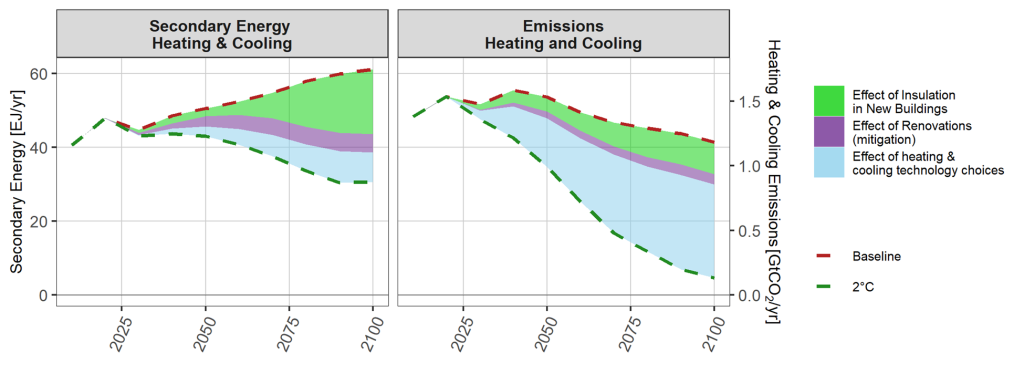Efficiency improvement and technology choice for energy and emission reductions of the residential sector
The residential sector currently accounts for one fifth of global energy use and corresponding greenhouse gas emissions, largely driven by increasing demand for space heating and cooling.
Both demand and supply side measures can aid with this sector’s decarbonization, however their specific contribution is unclear as it varies across multiple aspects: climate, household income, technology availability, building age, etc.
We use the IMAGE model to explore projections of energy demand across 26 regions and five urban and rural income quintiles to explore the contribution of (i) Increased insulation – differentiated between new building and renovations, (ii) Adoption of efficient heating and cooling technologies, and (iii) The application of rooftop solar photovoltaics.
The model shows that in a 2˚C scenario, global heating demand is expected to decrease from current levels by 27% and 66% by 2050 and 2100, respectively. However, due to increasing affluence in warmer regions, cooling demand is expected to increase by 176% and 286% respectively.
Direct residential emissions are almost eliminated by 2100 by combining increased envelope efficiency and advanced heating technologies in a synergistic manner, where the adoption of high efficiency heating and cooling reduces the need for increased insulation, and vice versa. Our results indicate how these strategies change according to climatic, economic, or building stock conditions of different households.
By combining these measures with rooftop PV, the net energy demand of many household types approaches zero, and in few cases residential buildings become net energy providers. However, poorer households may face difficulties in investing in technologies and insulation with very high upfront costs, thus keeping them in a low-efficiency, high-demand, high emission situation - while richer households can lower the energy demand and emissions and benefit from their “prosumer” status. This would further exacerbate economic inequalities as richer households can invest their way out of long-term energy and emission costs.

- Artikel | 4 January 2022to the article on the PBL website